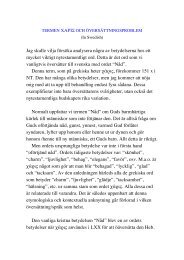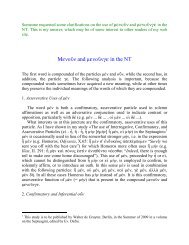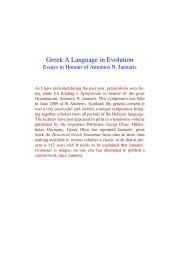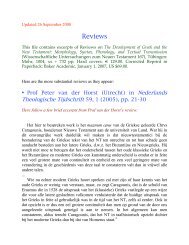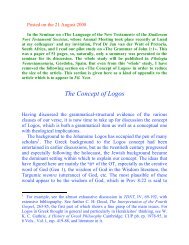A Brief CV. - Chrys-caragounis.com
A Brief CV. - Chrys-caragounis.com
A Brief CV. - Chrys-caragounis.com
Create successful ePaper yourself
Turn your PDF publications into a flip-book with our unique Google optimized e-Paper software.
9<br />
schaftlichen Diskurs ... in methodisch vorbildlicher Weise” and calls the book a<br />
“forschungsgeschichtlich nicht hintergehbaren Monographie” documenting “seine<br />
[Caragounis] umfassende Quellenkenntnis, eine präzise Gedankenführung und<br />
philologisch wie i.e. S. theologisch treffende Urteilsfähigkeit”.<br />
• Bibelns syn på homosexualitet, Stockholm 1998 (in Swedish)<br />
• Homoerotik. i forntid och nutid - och den kristna<br />
församlingen, Stockholm 2000 (in Swedish)<br />
This (little) book discusses the types of homoeroticism known in the ancient<br />
(particularly Greek) world and how ancient philosophers, scientists, and men of<br />
letters looked upon this phenomenon. The discussion takes place against the<br />
background of modern views about antiquity’s homosexual practices and what<br />
kinds of homoeroticism the Apostle Paul could or could not have known. It then<br />
concentrates on the New Testament texts that address this problem directly,<br />
particularly Paul’s treatment in Romans 1 and 1 Corinthians 6, which are treated<br />
exegetically. The book also raises the hermeneutical question of whether or not<br />
the New Testament view of homosexual practices is relevant today.<br />
• JOmofulofuliva: jArcaiva kai; Suvgcronh - kai; hJ Cristianikh; jEkklhsiva,<br />
jAqh'nai: jAsth;r th'" jAnatolh'", 2005<br />
• The Development of Greek and the New Testament:<br />
Morphology, Syntax, Phonology, and Textual Transmission<br />
(WUNT 137). Mohr-Siebeck: Tübingen 2004. xx + 732 pages.<br />
The above book is the first attempt, since the fatal error of Erasmus (who<br />
unintentionally through his propagation of an un-Greek pronunciation brought<br />
about a division in the Greek language) to rehabilitate the Greek language for<br />
New Testament scholarship and in particular to place NT Greek in perspective,<br />
that is, as part of an ongoing process of development from the beginning (of<br />
written documents in Mycenaean times) to the present, where not only pre-NT but<br />
also and especially post-NT linguistic developments are germane for a more<br />
correct understanding of the New Testament text. This book is thus a critique of<br />
the self-<strong>com</strong>plaisant way in which NT Greek has thus far been examined, that is,<br />
without regard for the unity of the language as a whole or the light which post-NT<br />
developments throw on the New Testament idiom. This is asserted in spite of<br />
much laudable work performed by NT and classical scholars of non-Greek<br />
descent.



